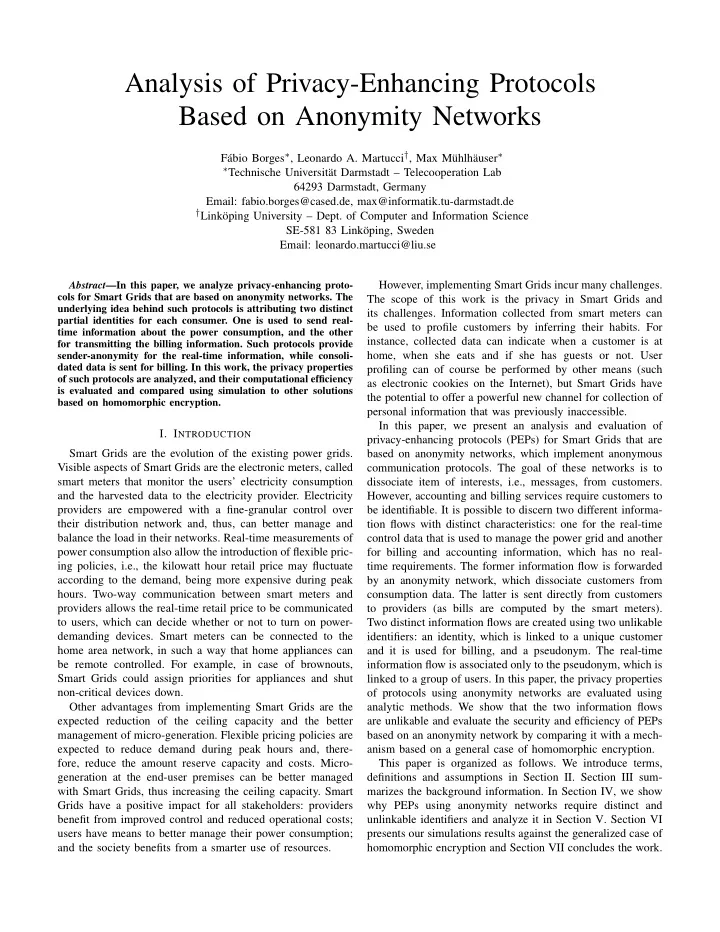

Analysis of Privacy-Enhancing Protocols Based on Anonymity Networks abio Borges ∗ , Leonardo A. Martucci † , Max M¨ auser ∗ F´ uhlh¨ ∗ Technische Universit¨ at Darmstadt – Telecooperation Lab 64293 Darmstadt, Germany Email: fabio.borges@cased.de, max@informatik.tu-darmstadt.de † Link¨ oping University – Dept. of Computer and Information Science SE-581 83 Link¨ oping, Sweden Email: leonardo.martucci@liu.se However, implementing Smart Grids incur many challenges. Abstract —In this paper, we analyze privacy-enhancing proto- cols for Smart Grids that are based on anonymity networks. The The scope of this work is the privacy in Smart Grids and underlying idea behind such protocols is attributing two distinct its challenges. Information collected from smart meters can partial identities for each consumer. One is used to send real- be used to profile customers by inferring their habits. For time information about the power consumption, and the other instance, collected data can indicate when a customer is at for transmitting the billing information. Such protocols provide sender-anonymity for the real-time information, while consoli- home, when she eats and if she has guests or not. User dated data is sent for billing. In this work, the privacy properties profiling can of course be performed by other means (such of such protocols are analyzed, and their computational efficiency as electronic cookies on the Internet), but Smart Grids have is evaluated and compared using simulation to other solutions the potential to offer a powerful new channel for collection of based on homomorphic encryption. personal information that was previously inaccessible. In this paper, we present an analysis and evaluation of I. I NTRODUCTION privacy-enhancing protocols (PEPs) for Smart Grids that are Smart Grids are the evolution of the existing power grids. based on anonymity networks, which implement anonymous Visible aspects of Smart Grids are the electronic meters, called communication protocols. The goal of these networks is to smart meters that monitor the users’ electricity consumption dissociate item of interests, i.e., messages, from customers. and the harvested data to the electricity provider. Electricity However, accounting and billing services require customers to providers are empowered with a fine-granular control over be identifiable. It is possible to discern two different informa- their distribution network and, thus, can better manage and tion flows with distinct characteristics: one for the real-time balance the load in their networks. Real-time measurements of control data that is used to manage the power grid and another power consumption also allow the introduction of flexible pric- for billing and accounting information, which has no real- ing policies, i.e., the kilowatt hour retail price may fluctuate time requirements. The former information flow is forwarded according to the demand, being more expensive during peak by an anonymity network, which dissociate customers from hours. Two-way communication between smart meters and consumption data. The latter is sent directly from customers providers allows the real-time retail price to be communicated to providers (as bills are computed by the smart meters). to users, which can decide whether or not to turn on power- Two distinct information flows are created using two unlikable demanding devices. Smart meters can be connected to the identifiers: an identity, which is linked to a unique customer home area network, in such a way that home appliances can and it is used for billing, and a pseudonym. The real-time be remote controlled. For example, in case of brownouts, information flow is associated only to the pseudonym, which is Smart Grids could assign priorities for appliances and shut linked to a group of users. In this paper, the privacy properties non-critical devices down. of protocols using anonymity networks are evaluated using Other advantages from implementing Smart Grids are the analytic methods. We show that the two information flows expected reduction of the ceiling capacity and the better are unlikable and evaluate the security and efficiency of PEPs management of micro-generation. Flexible pricing policies are based on an anonymity network by comparing it with a mech- expected to reduce demand during peak hours and, there- anism based on a general case of homomorphic encryption. fore, reduce the amount reserve capacity and costs. Micro- This paper is organized as follows. We introduce terms, generation at the end-user premises can be better managed definitions and assumptions in Section II. Section III sum- with Smart Grids, thus increasing the ceiling capacity. Smart marizes the background information. In Section IV, we show Grids have a positive impact for all stakeholders: providers why PEPs using anonymity networks require distinct and benefit from improved control and reduced operational costs; unlinkable identifiers and analyze it in Section V. Section VI users have means to better manage their power consumption; presents our simulations results against the generalized case of and the society benefits from a smarter use of resources. homomorphic encryption and Section VII concludes the work.
Recommend
More recommend